How To Clean Up A Hoarders House Fast? Find Out Here
Hoarding is a complex psychological condition where individuals excessively collect and cannot part with possessions, regardless of their actual value or usefulness. This accumulation of items can often result in cluttered living spaces, making it difficult, if not impossible, to use rooms for their intended purpose.
Beyond the physical limitations, hoarding can also pose serious health risks, from fire hazards due to flammable materials to unsanitary conditions. Tackling such overwhelming clutter requires a strategic and compassionate approach. In this guide, we will provide steps on how to clean up a hoarder’s house fast and efficiently to ensure safety and restore functionality.
What Is Hoarding Cleaning?
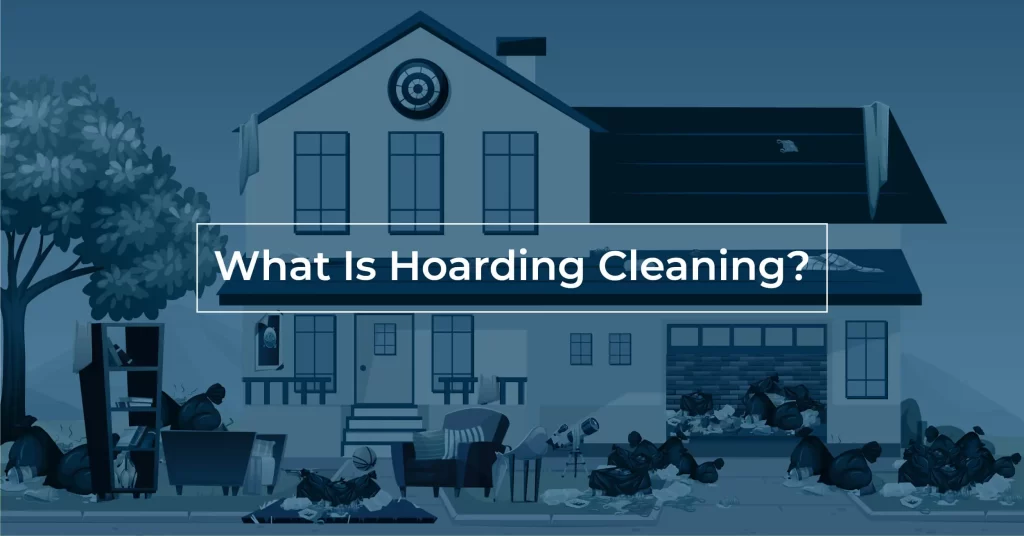
Hoarding cleaning refers to the specialized process of clearing out, cleaning, and organizing the home of an individual with hoarding tendencies. This isn’t just a typical house cleaning; it involves understanding the unique challenges and emotional factors associated with hoarding. Key components of hoarding cleaning include:
-
Assessment
-
Organization and Sorting
-
Deep Cleaning
-
Restoration
-
Maintenance and Follow-Up
How To Start Cleaning A Hoarder’s House?
1. Come Up With A Strategic Cleaning Plan
-
Assess the extent of the hoarding and prioritize areas of concern.
-
Determine if professional help or additional hands are needed.
-
Set realistic goals and timelines for each phase of cleaning.
2. Make Sure You Have The Correct Safety Gear
-
Safety First: Recognize that hoarded homes can be unpredictable. Items can become unstable and fall, trapping or injuring someone.
-
Gear Up: Always wear face masks and respirators as biohazardous materials, such as human or pet waste, dead animals, rotting garbage, and mold, might be present.
-
Dress Appropriately: Wear steel-toe boots, safety goggles, a mask, a Tyvek suit, and gloves to protect against potential hazards.
-
Light The Way: Ensure you have flashlights or headlamps, especially if certain areas of the home are dark or have no electricity.
3. Clear Hallways And Stairs To Have A Clear Walkway
-
This ensures safe movement throughout the house.
-
Removing obstacles also provides immediate space to sort items.
4. Start Cleaning Out Individual Rooms
-
Gather Tools: Stock up on trash bags, boxes, brooms, vacuums, cleaning materials, anti-bacterial sprays, and other essential tools.
-
Tackle One Room At A Time: Begin with rooms that can offer immediate relief or are critical for daily functions, like the bathroom or kitchen.
-
Sort As You Go: Create designated areas or bins for items to keep, donate, recycle, and discard.
5. Dispose Of Waste Materials
-
Always separate recyclables from trash piles.
-
Ensure that hazardous materials are disposed of safely and in accordance with local regulations.
-
Make regular trips to the landfill or hire a waste disposal service to handle large quantities of debris.
6. Salvaged Items
-
Set aside salvageable items in good condition for donation.
-
Contact local charities like the Salvation Army to arrange pickups or drop-offs.
-
Remember to get a receipt for tax purposes, if applicable.
Is It Safe To Clean A Hoarder’s House?
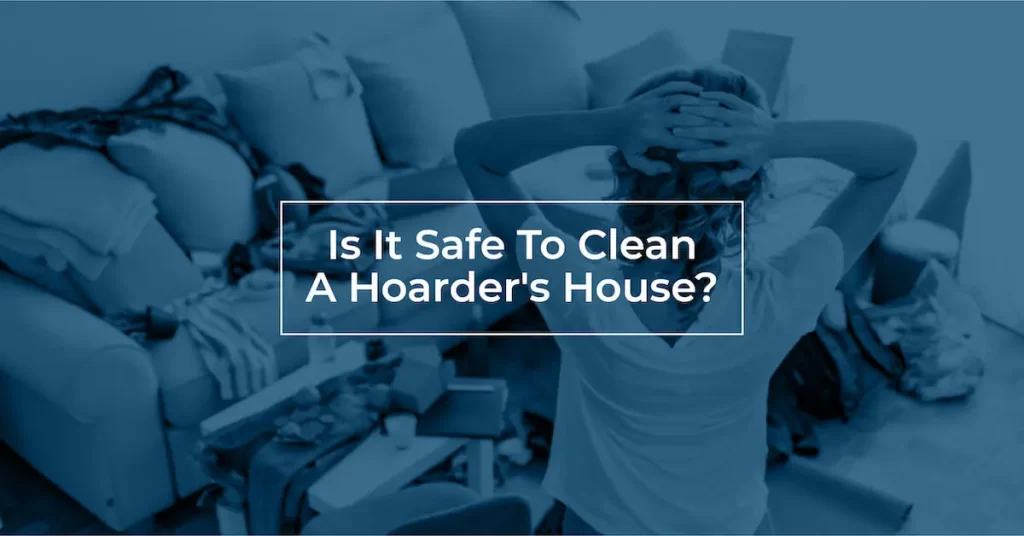
Cleaning a hoarder’s house can pose a range of safety and health risks, but with the right precautions, it can be done safely. Here’s what to consider:
Physical Risks
Stacked or cluttered items can fall or shift, posing a danger to those cleaning. The home’s structural integrity might also be compromised due to the weight or decay caused by the hoarded items.
Biological Hazards
Over time, rotting food, deceased animals, human waste, or other organic matter can accumulate. This can result in mold growth, pests, and bacteria which can be harmful if inhaled or contacted directly.
Air Quality Issues
Poor ventilation combined with dust, mold, and possibly animal dander can lead to respiratory issues, especially for those with pre-existing conditions like asthma.
Emotional and Psychological Challenges
Confronting a hoarding situation can be emotionally draining for the individual who hoards and those helping to clean. There may be a strong emotional attachment to items, leading to stress or conflict.
Unsafe Items
There could be broken glass, sharp objects, or hazardous chemicals in the clutter.
Pests
Infestations from rodents, insects, or other pests can pose risks regarding bites, disease transmission, or allergies.
Tips To Safely Clean a Hoarder’s House
-
Wear Appropriate Safety Gear: This includes masks or respirators, gloves, protective eyewear, and durable clothing.
-
Ventilate the Area: Open windows and use fans to improve air circulation.
-
Stay Updated on Vaccinations: Ensure you’re up-to-date with tetanus and other relevant vaccinations.
-
Avoid Lone Cleaning: Always have someone with you for safety reasons.
-
Secure Structural Integrity: If you suspect the home might be structurally unsound, consult a professional before beginning the clean-up.
-
Seek Professional Help: Consider hiring professionals specializing in hoarder or biohazard cleaning, especially if the situation is severe.
How Long Does It Take To Declutter A Hoarder’s House?
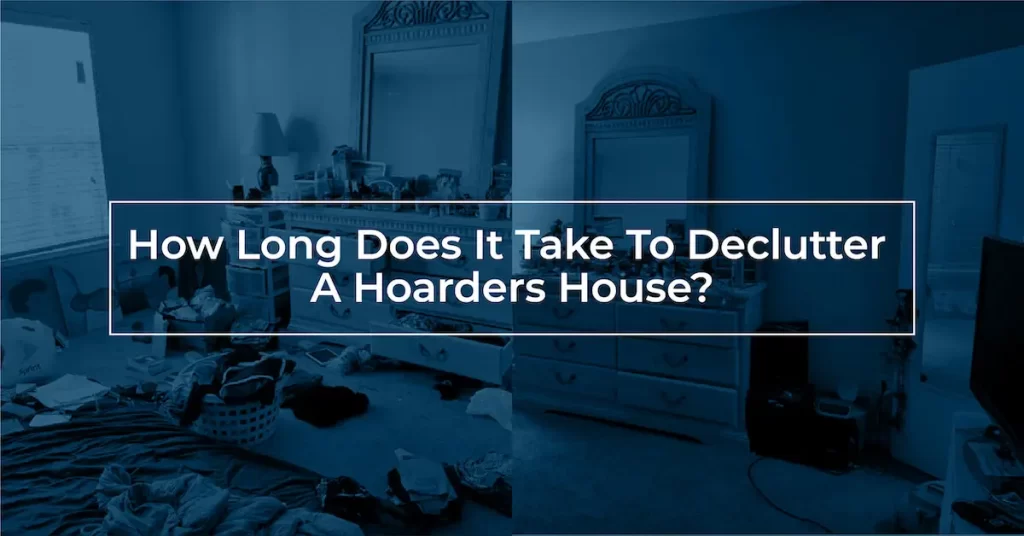
The time it takes to declutter a hoarder’s house can vary widely based on several factors. Here’s a breakdown of what can influence the duration:
Severity of the Hoarding Situation
-
Level 1 (Lowest Severity): Clutter is not excessive; all doors and stairways are accessible. It might take a day or two with a few people helping.
-
Level 2: Clutter fills two or more rooms with mild odors. This might take a weekend or longer.
-
Level 3: Visible clutter outside the home, one or more broken appliances, structural damage. Several days to a week.
-
Level 4: Structural damage is more severe, mold, pests, and non-working utilities. One to several weeks.
-
Level 5 (Highest Severity): Most severe conditions with extreme structural damage, rotting food, and human waste. Several weeks to months.
Size of the House
Naturally, a larger home with more rooms will take longer to declutter than a smaller one.
Amount of Clutter
A house packed floor-to-ceiling in every room will take much longer than one with moderate clutter.
Availability of Help
Decluttering goes faster with a team. The more hands on deck, whether friends, family, or professionals, the quicker the process.
Emotional Attachment And Decision-Making Speed
A hoarder’s emotional attachment to their sentimental items can complicate decluttering. Decisions about what to keep, donate, or throw away can be agonizing and time-consuming for the individual.
Safety Concerns
Addressing health hazards, such as mold, pests, or structural issues, can add time to the decluttering process, as these need to be resolved to remove items safely.
Organizational Methods
The system or method used to organize and declutter can influence the time it takes. Some methods may be more time-efficient than others.
Disposal And Recycling
The time it takes to properly dispose of or recycle items, especially in large quantities, can add to the duration. Consider heavy-duty trash bags and advanced tools if needed.
Frequency Of Sessions
Some professionals recommend shorter, more frequent decluttering sessions to reduce overwhelm and fatigue. However, this approach may extend the overall timeframe.
Setting Goals
Clear goals can speed up the process. If the aim is to make an unlivable space livable quickly, then non-essential items can be boxed up and dealt with later, accelerating the initial decluttering phase.
How Do You Clean A Hoarder’s House After Death?
Cleaning a hoarder’s house after their death is daunting and emotional. Firstly, prioritize safety. Before diving into the cleanup, it’s crucial to assess the environment for potential hazards like mold, pests, or unstable structures. Wearing protective gear, such as gloves and masks, is a must.
Secondly, sort the accumulated items into categories: keep, donate, and dispose of. While doing this, be on the lookout for sentimental or valuable items, as well as important documents. With the majority of items categorized, focus on thorough cleaning. This involves disinfecting surfaces, addressing mold removal or pest issues, and potentially hiring professionals for deep cleaning tasks.
Repairs may be necessary if the hoarding has led to structural or appliance damage. Throughout the process, ensure emotional support is available, as the task is as much an emotional journey as a physical one.
How Do You Get Rid Of A Hoarder House Smell?
Eliminate The Source Of The Odor
First and foremost, identify and remove the primary causes of the smell, such as rotting food, mold, animal waste, or decomposing materials. Properly and safely dispose of these items to kickstart the deodorizing process.
Ventilate The Space
Open all windows and doors to let fresh air flow through the house. Using fans can help accelerate this process, pushing out stale air and drawing in fresh air.
Deep Cleaning
Thoroughly clean surfaces with cleaning solutions specifically designed for odor elimination. Pay close attention to floors, walls, and upholstery, which can retain odors. In extreme cases, consider replacing carpets or repainting walls using an odor-blocking primer.
Use Specialized Equipment
Employ air purifiers equipped with activated carbon filters to absorb any lingering smells.
Natural Neutralizers
Place bowls filled with baking soda, vinegar, or activated charcoal around the house. These natural substances can help absorb and neutralize odors over time.
Seek Professional Help
For particularly stubborn odors, consider hiring professional cleaning services specializing in odor removal. They have the tools and expertise to handle persistent smells effectively.
How To Clean Up A Hoarders House Fast: Frequently Asked Questions
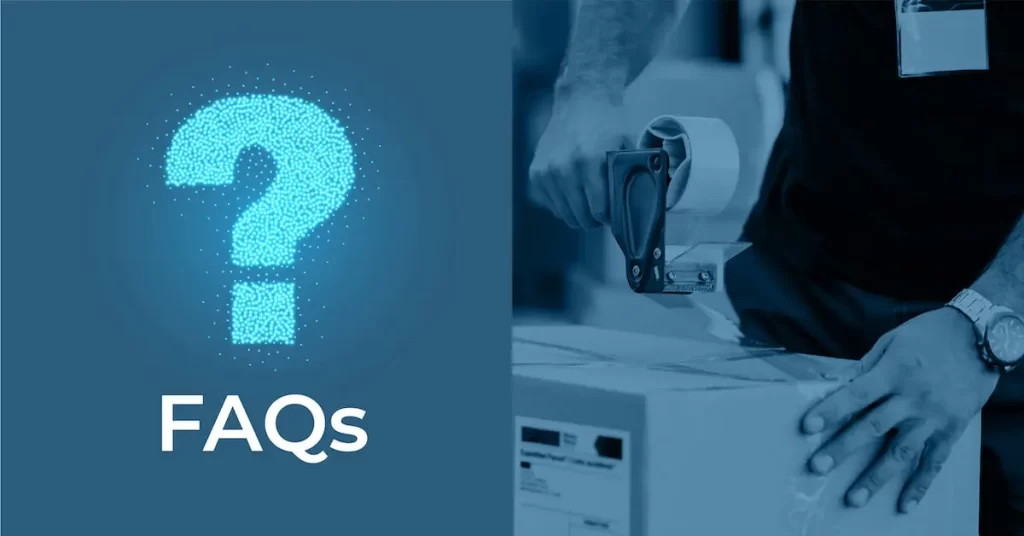
What Will Absorb Odors In A House?
The following can be used to absorb odors:
-
Baking soda: Sprinkle on carpets or place in bowls to neutralize odors.
-
Activated charcoal: Often used in air purifying bags, it’s a potent odor absorber.
-
White vinegar: Place in dishes around rooms to dissipate strong smells.
-
Coffee grounds: Leave them in open containers to mask and absorb odors.
-
Houseplants: Plants like spider plants and peace lilies can purify the air and help reduce indoor odors.
Is It Safe To Clean A Hoarder’s House?
Cleaning a hoarder’s house can pose potential health risks and safety concerns, including exposure to mold growth, pests, hazardous waste, and unstable structures. Protective gear, such as gloves, masks, and, in some cases, full-body suits, should be worn. It’s crucial to approach the task methodically, ensuring areas are structurally sound before entering. In severe cases, professional help or a specialist cleanup crew might be necessary to ensure safety and effective cleaning.
Can Hoarders Lose Their Home In Canada?
In Canada, hoarders can potentially lose their homes if the hoarding creates health and safety concerns or violates municipal by-laws. Local health departments or municipal by-law enforcement officers can intervene when a property threatens the occupant or the community.
If the homeowner fails to address the violations or concerns within a given timeframe, the local government can take legal actions, which may include eviction or, in extreme cases, property seizure. However, such measures are typically a last resort, and authorities often prioritize offering support and resources to address the issue.
Conclusion
Cleaning a hoarder’s house is a tough and detailed task requiring physical work and empathy. Safety is essential, and it is crucial to handle the clutter systematically. Sometimes, professional help is needed. The process highlights the need for compassion and understanding for those dealing with hoarding.
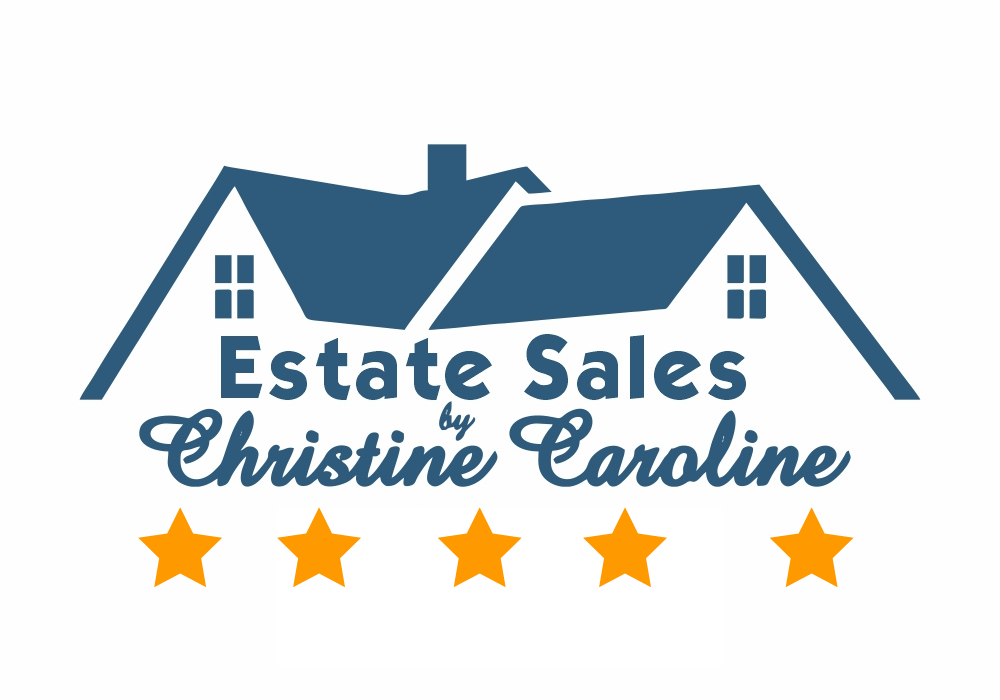
Recent Comments